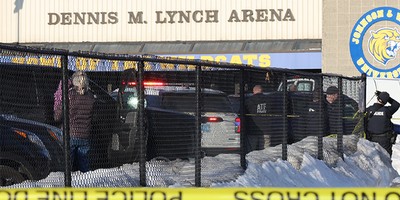Patrick McMahon is an Air Force combat veteran and nurse practitioner who worked as a transplant coordinator.
In a new bombshell lawsuit, McMahon claims he was fired for raising one too many red flags about whether his patients were really dead before doctors harvested their organs.
According to The New York Post, which broke the story, McMahon says that last September a 19-year-old man injured in a car crash was sent to the Nassau University Medical Center. The young patient was still laboring to breathe and had other signs of brain activity. But Michael Goldstein, director of the federally funded New York Organ Donor Network, allegedly said during a conference call: "This kid is dead, you got that?"
"I have been in Desert Storm, Iraq and Afghanistan in combat," McMahon told The Post. "I worked on massive brain injuries, trauma, gunshot wounds, IEDs. I have seen worse cases than this and the victims recover."
Why would doctors do something like that?
Maybe because organ donations are urgently needed to save many lives and also because organ donations give hospitals a great deal of profitable business?
The law gives doctors -- and doctors, alone -- the irrevocable and unreviewable power to declare death. You are dead, in the eyes of the law, when a doctor declares you so -- and once he or she does, your organs may be taken to save other people's lives. (After which, you will certainly be dead.)
Veteran science writer Dick Teresi, by coincidence, wrote a book on this phenomenon called "The Undead."
Teresi's confidence in doctors' objective ability to determine brain death was shaken when he entered his father's room in the hospital after a heart attack. His dad "propped himself up, shook my hand, and said, 'Thank you for coming.' We had a short talk."
Recommended
A young doctor later approached Teresi and said, "I'm sorry, but your father's not going to regain consciousness before he dies. You thought you talked to him. He probably made some reflexive sounds, and you interpreted it as speech."
Teresi actually believed the doctor and was embarrassed.
Then a second doctor entered his father's room and his father again propped himself up, shook the doctor's hand and they spoke.
This doctor told Teresi, "Sure. I talk to Cliff every day."
What about the first doctor -- the one who told Teresi it was just meaningless sounds? "Oh," the older doctor replied, "that's a neurology resident. They teach them that in medical school today. Everybody is dead or in a coma."
Teresi's book is filled with disturbing evidence that "brain death" as it is practiced today is not a scientific concept, but essentially a religious or philosophical one administered by doctors untrained in either discipline.
Among the most chilling details Teresi brings back from the land of the undead: The allegedly dead bodies are given anesthetic before their organs are harvested. Why? Because doctors found that, otherwise, blood pressure spiked during surgery in a way that we associate with pain or trauma. But how can a dead body feel pain?
McMahon's lawsuit is rife with similar peculiarities. In November 2011, he says, a woman who had suffered a drug overdose was admitted to Staten Island University Hospital and declared brain dead. Her body was still jerking and she had other signs of brain activity. He noticed she was being given a "paralyzing anesthetic," perhaps to make her appear more dead.
On Nov. 4, McMahon told Helen Irving, president and CEO of the New York Organ Donor Network, that one in five patients declared brain dead showed signs of brain activity at the time death was declared. Irving allegedly replied, "This is how things are done."
"If you wait for everything to be a hundred percent," a physician told Teresi, "you'd never have organ donation."
Brain-dead patients often show many signs of life: They move, get goose bumps, heal from wounds and even grow. When Alan Shewmon presented evidence of this at a 2000 conference, doctors responded that the human is nonetheless dead in these cases because the "person" is missing.
From a scientific standpoint, this is very close kin to saying cutting out this human's heart would not be murder because his soul had already flown to God.
Maybe so, but who are doctors to say?
If the medical profession is growing used to killing, the fault is not theirs, but ours. It's a convenient fiction that McMahon's lawsuit gives us a new chance to seriously reconsider.

























Join the conversation as a VIP Member